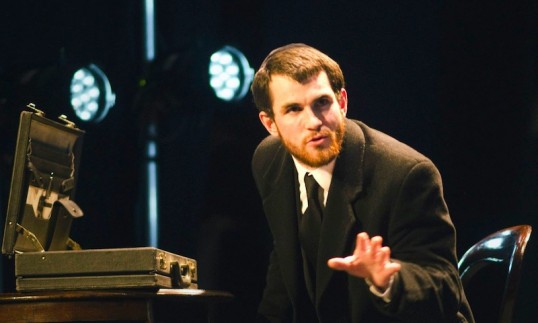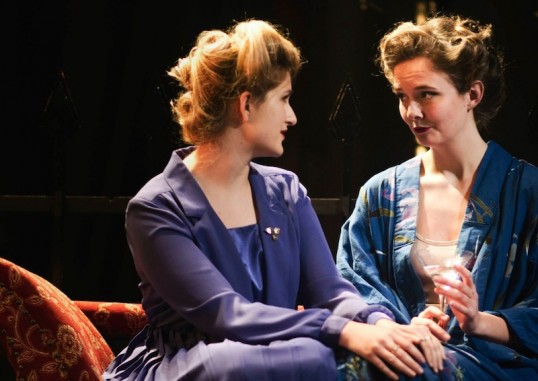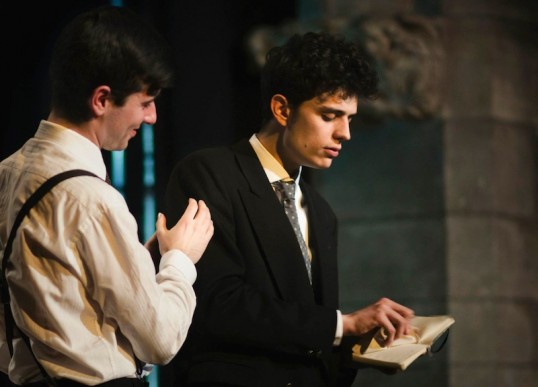The Merchant of Venice
✭✭✭✩✩ Ambitiously intelligent
Assembly Roxy: Tue 10 – Sat 14 Mar 2015
Aiming high, Edinburgh University Shakespeare Company’s production of The Merchant of Venice is accomplished and intelligent. If it does not always live up to its potential, it is not for want of trying.
Famously, this is a play that combines several sources and has some peculiar shifts in tone. The main plot is a marriage comedy featuring Portia and Bassanio that moves oddly into cross-dressing identity confusion.
Modern productions, however, tend to focus on the problematic character of the Jewish moneylender Shylock, his mistreatment at the hands of the Venetian Christians, and his desire for revenge by extracting ‘a pound of flesh’ from the merchant Antonio when he defaults on a bond.
Director Rae Glasman has chosen to set the play in 1930s London, complete with contemporary music and ominous radio announcements. This does make for some interesting resonances. However, the changing of the odd snatch of dialogue – ‘Venice’ becomes ‘London’, for example – has the unfortunate effect of emphasising those parts of the play that do not fit in with the new setting.
Why, for example, are letters still scrolls or sealed with wax? The references to ‘the law of England’, while reinforcing the universal message that access to justice is always limited as far as the outsider is concerned, make it difficult for the trial scene to work dramatically.
Shylock asking Tubal about the news from ‘Germany’ rather than ‘Genoa’ in 1939, and receiving a wordless response, opens up some huge and dreadful questions that the production is not quite up to answering.
a director to watch
The very fact that it is so thought-provoking, however, shows that Glasman has put a great deal of consideration into this. This is also shown by the care put into her direction – the huge cast are always used sensitively and effectively, while there are some very impressive touches, such as the way Lorenzo and Jessica are used in Act V.
All of this marks Glasman out as a director to watch. This is very much a director’s version of the play and it would have needed an exceptionally strong cast to realise her vision fully.
As it is, despite their best efforts, they do not quite carry it off. The decision to transform the Venetians into Old Etonians has some unfortunate contemporary associations that are never really overcome. The presence on stage of a gaggle of braying Bullingdon Club graduates leads to some unsubtle, one-note performances that quickly pall.
What is noticeable, however, is that the verse is consistently well delivered. Furthermore, several of the cast manage to grow in confidence and assurance as the play progresses. Will Fairhead’s Bassanio gains subtlety and maturity, while Kirsty Findlay transforms Shylock’s daughter Jessica from a spoilt child into a much more complex and conflicted figure. Rory McIvor similarly makes her suitor Lorenzo a more rounded character as the play progresses.
The decision to change the clown Lancelot Gobbo into Lucy means that Chaz Watson has the chance to show off some scene-stealing physical humour and makes the character much funnier than is usually the case. Caprice Avis also has a naturally funny stage presence as the maid Nerissa, and her casual rapport with Isobel Moulder, who combines the glacial and the gawky to great effect as her mistress Portia, is impressive.
Hooray Henrys
Modern productions often sideline Antonio, the Merchant of the title, or emphasise his relationship with Bassanio. Here Pedro Leandro’s Antonio is fatalistic and so underplayed in comparison to the Hooray Henrys who surround him that he makes little impact.
Shylock, on the other hand, can never fail to make an impact. A production that plays up the anti-Semitism, as this does, really needs an actor with enough guns to sink a battleship to carry it. Joe Shaw is not quite that actor, despite a well considered and insightful performance.
His rendering of the ‘hath not a Jew eyes?’ sequence is more than enough to put the Etonians’ gas at a peep, but his determination to carry through his revenge on Antonio does not quite ring true in a trial scene that has neither the necessary tension nor sufficient poetry.
This is due partly to a failure of nerve that tries to introduce comedy where it does not always belong. The replacement of the Prince of Morocco, one of Portia’s failed suitors, by a ‘Prince of Hull’ removes one possible source of offence to modern audiences, but instead replaces it with a comedy Yorkshireman who, despite Tom Birch’s heroic efforts, is spectacularly ill-judged. Lewis McKenzie’s Arragon is a much more carefully considered and effective comedy turn.
This is a production on an ambitious scale and is largely successful technically. Some thought should have gone into the placing of actors, however – too often when there are only a small number of performers, they are sitting downstage and invisible to a large proportion of the audience, thanks to the set-up in the Roxy.
The Merchant is often cut more ruthlessly than this, with some of the characters lost altogether, and this probably should have happened here, as it feels too long.
Nevertheless, this is a production with obvious theatrical intelligence behind it, and has more successes than failures.
Running time 3 hours including one interval
Assembly Roxy, 2 Roxburgh Place, EH8 9SU
Run ends Saturday 14 March 2015
Evenings 7.30 pm, Matinee Sat 2.30 pm
Tickets and further details from http://www.eushakespeare.com/























